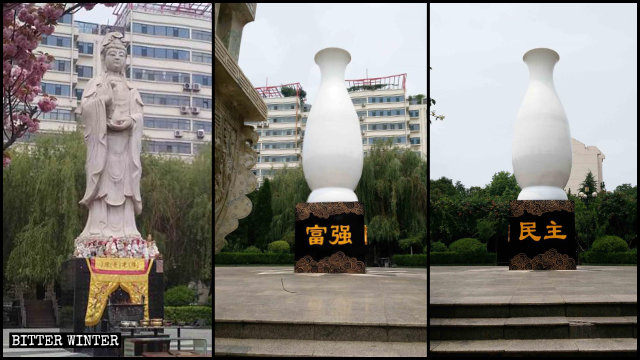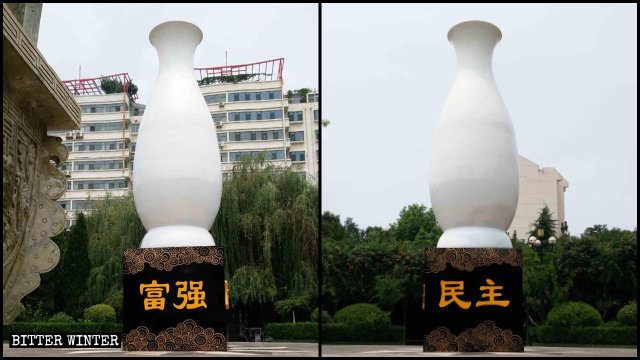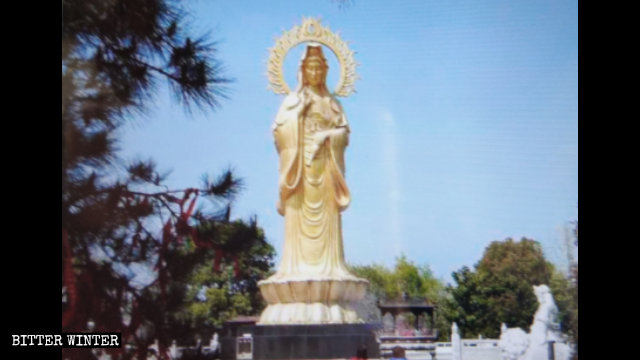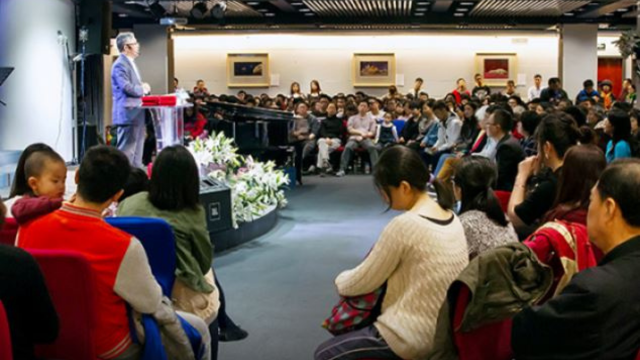The Chinese government is determined to destroy all outdoor religious statues in the country, regardless of their location – be it in a temple or a public square.
by Cai Congxin
Buddhist deity concealed
A residential community plaza in Lanshan district of Linyi city in the eastern province of Shandong used to have a white marble statue dedicated to Guanyin, the Goddess of Mercy. On the first and 15th day of each lunar month, many pilgrims would come to it to burn incense and worship Buddha.
In early June, Lanshan district officials came for a religious inspection and declared that Guanyin statues aren’t allowed in the community. “Worshipping deities is tantamount to engaging in feudal superstition,” they proclaimed, adding that China is the domain of the Communist Party, and people can only believe in it. They then threatened to dismiss the community’s officials if they didn’t tear down the statue.

Since a forest surrounds the community plaza, it was complicated to bring a crane or other heavy machinery to demolish the statue, so community officials made an interim decision to conceal it in a large fiberglass vase and tear down the small Buddhist statues at the base of the Guanyin. Slogans promoting the core socialist values, like “prosperity” and “democracy,” were posted around the bottom of the statue. The juxtaposition of the Chinese characters for “democracy” with Guanyin “confined” in the vase is particularly ironic.

33 Guanyin statues forcibly demolished
Guanyin Island, located in the Zhanghe New Area of Jingmen city in the central province of Hubei, is a national 4A-level scenic spot that used to have a composition of 33 Guanyin statues: one 18-meter tall Goddess of Mercy, surrounded by 32 small statuettes, each just over one meter in height.

On April 14, Zhanghe New Area officials ordered to demolish the Guanyin statues to “stop the commercialization of Buddhism and Taoism.” The demolition work lasted for half a month and cost upward of two million RMB (about $ 280,000).
The public didn’t seem to agree with the government’s rationale for tearing down the statues. Some residents said that the reason the CCP is waging this campaign to demolish Buddhist statues is to gain ideological control. When the central government inspection team visited China’s southern provinces and asked local people whom they should thank for having a better life, the majority replied that they were thankful to the Bodhisattva. This answer infuriated the officials who cannot tolerate people’s devotion to anything or anyone but the Communist Party. In Communist China, even saying “Thank God” may lead to detention.
A statue at an ancient temple demolished
In mid-April, a Guanyin statue at Jishan Temple, a millennium-old temple in Hubei Province’s Jingmen city, was also torn down on orders from the government. According to witnesses, on the demolition day, more than 100 personnel, including provincial and municipal government officials, regular and special police, blocked off the area around the temple and prohibited anyone from entering the temple. After four days, the 13-meter-tall Guanyin statue was reduced to rubble.
According to a source who asked to remain anonymous, the order to tear down the statue was issued by the central government; if it were not carried out, local officials would have been dismissed from their posts.
Source: Bitter Winter












